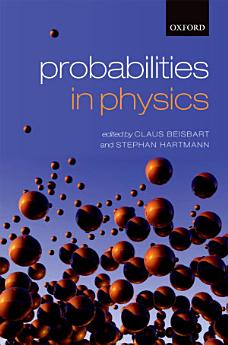Probabilities in Physics
Claus Beisbart · Stephan Hartmann
sept 2011 · Oxford University Press
Libro electrónico
464
Páginas
family_home
Apto
info
reportLas calificaciones y opiniones no están verificadas. Más información
Acerca de este libro electrónico
Many results of modern physics--those of quantum mechanics, for instance--come in a probabilistic guise. But what do probabilistic statements in physics mean? Are probabilities matters of objective fact and part of the furniture of the world, as objectivists think? Or do they only express ignorance or belief, as Bayesians suggest? And how are probabilistic hypotheses justified and supported by empirical evidence? Finally, what does the probabilistic nature of physics imply for our understanding of the world? This volume is the first to provide a philosophical appraisal of probabilities in all of physics. Its main aim is to make sense of probabilistic statements as they occur in the various physical theories and models and to provide a plausible epistemology and metaphysics of probabilities. The essays collected here consider statistical physics, probabilistic modelling, and quantum mechanics, and critically assess the merits and disadvantages of objectivist and subjectivist views of probabilities in these fields. In particular, the Bayesian and Humean views of probabilities and the varieties of Boltzmann's typicality approach are examined. The contributions on quantum mechanics discuss the special character of quantum correlations, the justification of the famous Born Rule, and the role of probabilities in a quantum field theoretic framework. Finally, the connections between probabilities and foundational issues in physics are explored. The Reversibility Paradox, the notion of entropy, and the ontology of quantum mechanics are discussed. Other essays consider Humean supervenience and the question whether the physical world is deterministic.
Acerca del autor
Claus Beisbart is Assistant Professor at the Technical University Dortmund (Germany). He holds a doctorate in physics (2001) and a doctorate in philosophy (2004; both from the Ludwig Maximilian University Munich). During the academic year 2008/09, he was a Visiting Fellow at the Center for Philosophy of Science at the University of Pittsburgh. His main work is in the philosophy of physics, in particular the philosophy of cosmology, in the general philosophy of science, and in ethics and social-choice theory. Stephan Hartmann is Chair of Philosophy of Science at LMU Munich, Alexander von Humboldt Professor, and Co-Director of the Munich Center for Mathematical Philosophy (MCMP). From 2007 to 2012 he worked at Tilburg University, The Netherlands, where he was Chair in Epistemology and Philosophy of Science and Director of the Tilburg Center for Logic and Philosophy of Science (TiLPS). Before moving to Tilburg, he was Professor of Philosophy in the Department of Philosophy, Logic and Scientific Method at the London School of Economics and Director of LSE's Centre for Philosophy of Natural and Social Science. His primary research and teaching areas are philosophy of science, philosophy of physics, formal epistemology, and social epistemology. Hartmann published numerous articles and the book Bayesian Epistemology (with Luc Bovens) that appeared in 2003 with Oxford University Press.
Califica este libro electrónico
Cuéntanos lo que piensas.
Información de lectura
Smartphones y tablets
Instala la app de Google Play Libros para Android y iPad/iPhone. Como se sincroniza de manera automática con tu cuenta, te permite leer en línea o sin conexión en cualquier lugar.
Laptops y computadoras
Para escuchar audiolibros adquiridos en Google Play, usa el navegador web de tu computadora.
Lectores electrónicos y otros dispositivos
Para leer en dispositivos de tinta electrónica, como los lectores de libros electrónicos Kobo, deberás descargar un archivo y transferirlo a tu dispositivo. Sigue las instrucciones detalladas que aparecen en el Centro de ayuda para transferir los archivos a lectores de libros electrónicos compatibles.







